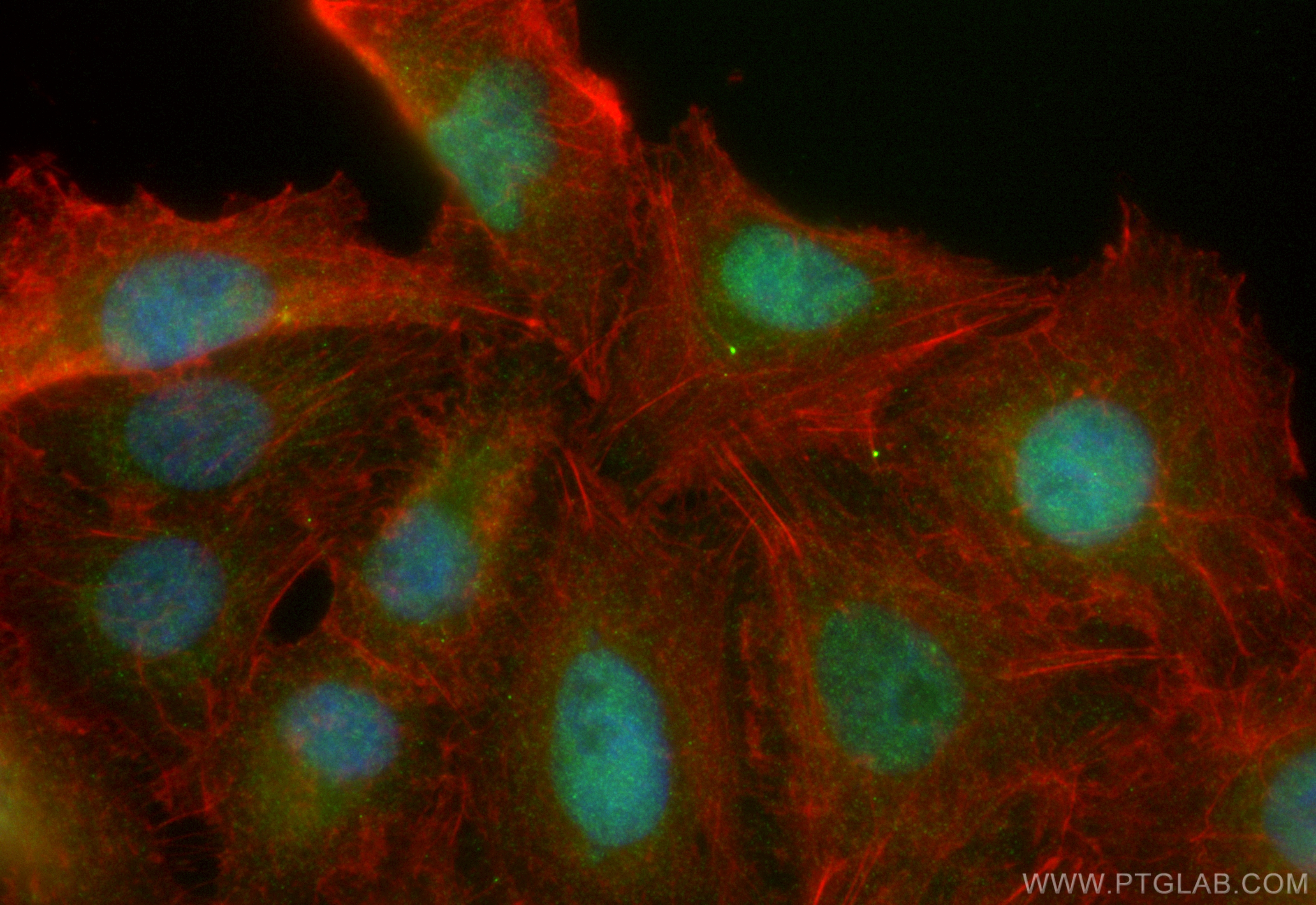验证数据展示
经过测试的应用
| Positive IF/ICC detected in | A549 cells |
推荐稀释比
| 应用 | 推荐稀释比 |
|---|---|
| Immunofluorescence (IF)/ICC | IF/ICC : 1:50-1:500 |
| It is recommended that this reagent should be titrated in each testing system to obtain optimal results. | |
| Sample-dependent, Check data in validation data gallery. | |
产品信息
CL488-83897-4 targets SIK1 in IF/ICC applications and shows reactivity with human samples.
| 经测试应用 | IF/ICC Application Description |
| 经测试反应性 | human |
| 免疫原 |
CatNo: Ag28481 Product name: Recombinant human SIK1 protein Source: e coli.-derived, PGEX-4T Tag: GST Domain: 337-564 aa of BC038504 Sequence: IYYLLLERLKEYRNAQCARPGPARQPRPRSSDLSGLEVPQEGLSTDPFRPALLCPQPQTLVQSVLQAEMDCELQSSLQWPLFFPVDASCSGVFRPRPVSPSSLLDTAISEEARQGPGLEEEQDTQESLPSSTGRRHTLAEVSTRLSPLTAPCIVVSPSTTASPAEGTSSDSCLTFSASKSPAGLSGTPATQGLLGACSPVRLASPFLGSQSATPVLQAQGGLGGAVLL 种属同源性预测 |
| 宿主/亚型 | Rabbit / IgG |
| 抗体类别 | Recombinant |
| 产品类型 | Antibody |
| 全称 | salt-inducible kinase 1 |
| 别名 | 240961H3, EC:2.7.11.1, MSK, salt inducible kinase 1, Salt-inducible kinase 1 |
| 计算分子量 | 783 aa, 85 kDa |
| 观测分子量 | 85 kDa |
| GenBank蛋白编号 | BC038504 |
| 基因名称 | SIK1 |
| Gene ID (NCBI) | 150094 |
| RRID | AB_3673324 |
| 偶联类型 | CoraLite® Plus 488 Fluorescent Dye |
| 最大激发/发射波长 | 493 nm / 522 nm |
| 形式 | Liquid |
| 纯化方式 | Protein A purification |
| UNIPROT ID | P57059 |
| 储存缓冲液 | PBS with 50% glycerol, 0.05% Proclin300, 0.5% BSA, pH 7.3. |
| 储存条件 | Store at -20°C. Avoid exposure to light. Stable for one year after shipment. Aliquoting is unnecessary for -20oC storage. |
背景介绍
SIK1(Salt-inducible kinase 1) is also named SIK, SNF1LK, and belongs to the CAMK Ser/Thr protein kinase family. It associates constitutively with the NK regulatory complex and is responsible for increases in its catalytic activity following small elevations in intracellular sodium concentrations(PMID:17939993). SIK1 is required for the phosphorylation of class II HDACs and expression of MEF2 target genes in myocytes(PMID:17468767). Defects in SIK1 may be associated with some cancers, such as breast cancer. Loss of SIK1 correlates with poor patient outcomes in breast cancers(PMID:19622832).
实验方案
| Product Specific Protocols | |
|---|---|
| IF protocol for CL Plus 488 SIK1 antibody CL488-83897-4 | Download protocol |
| Standard Protocols | |
|---|---|
| Click here to view our Standard Protocols |


